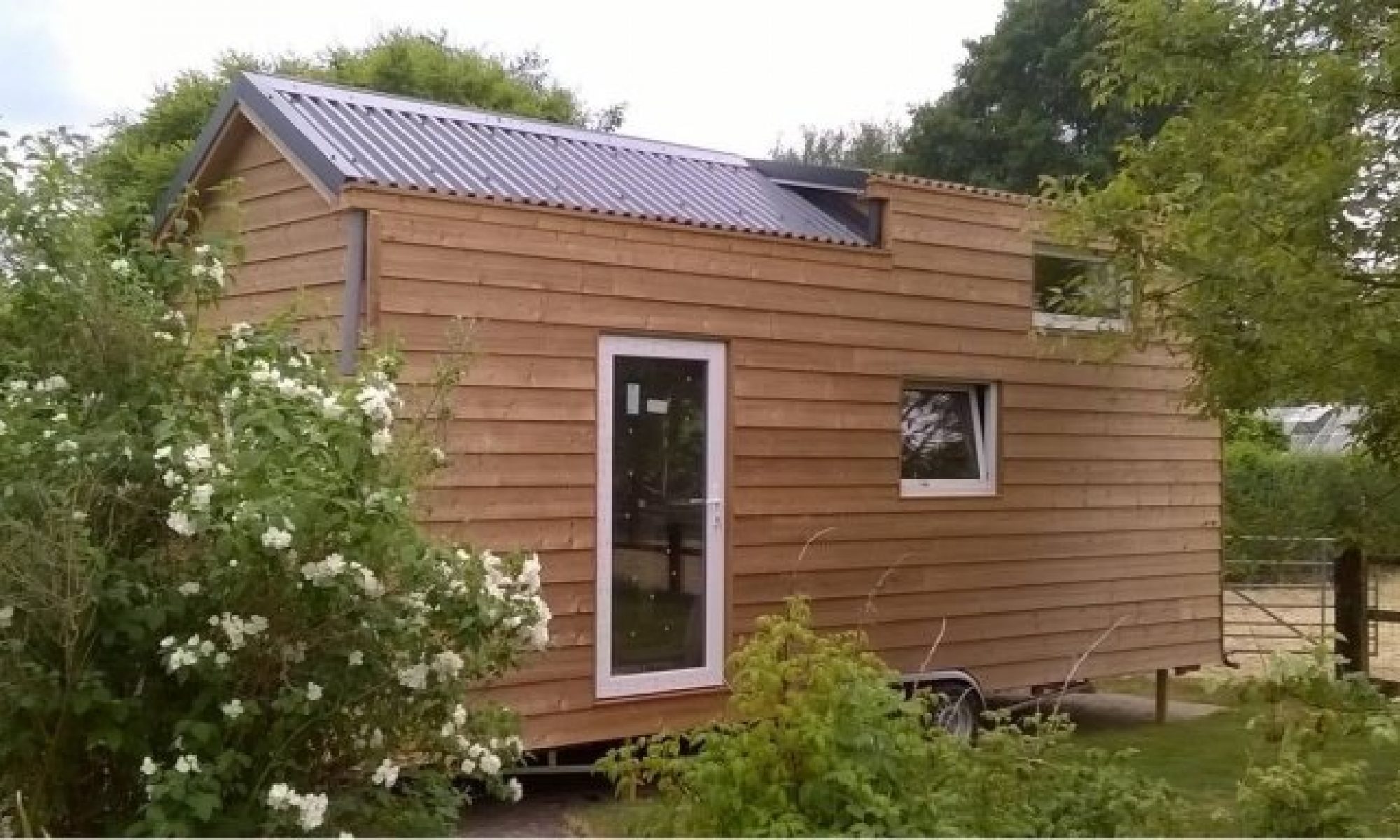Lees dit artikel in het Nederlands:
No, we’re not gonna solve the whole climate issue here. But imagine what impact it would have if we could all exclude plastic film and other disposable plastics from our kitchen. Wouldn’t that be a nice start after all? And it is an absolutely feasible start!
In my tiny house I do not use plastic foil at all, no aluminum foil and almost no plastic storage boxes. These are the alternatives I use:
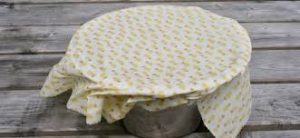 Beeswax cloths.
Beeswax cloths.
These are cotton cloths that are soaked in beeswax, making them air- and watertight. You can use them to cover bowls and jars, to cover a sliced melon, to pack leftover food, … You can also use them to store bread, cheese, sandwiches, etc. It is not recommended to use them to store fish or meat.
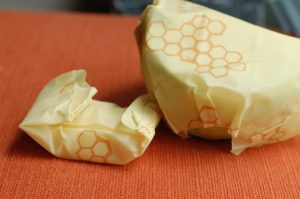 After you used them, wash them with lukewarm water and a little soap, let them dry and you can use them again. The beeswax hardens in the refrigerator so the cloth keeps its shape well and therefore closes well. Once you remove the cloth from the refrigerator and handle it with your warm hands, it becomes softer and you can easily give it the right shape to fit properly.
After you used them, wash them with lukewarm water and a little soap, let them dry and you can use them again. The beeswax hardens in the refrigerator so the cloth keeps its shape well and therefore closes well. Once you remove the cloth from the refrigerator and handle it with your warm hands, it becomes softer and you can easily give it the right shape to fit properly.
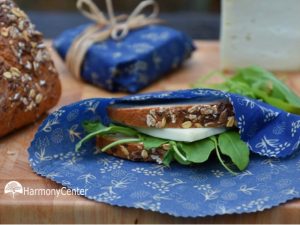 You can buy these cloths in different (online) stores (with all sorts of nice motifs and in different sizes), but you can also make them yourself. Many recipes circulate on the internet. After a year the beeswax might be too ‘damaged’ by folding the cloths each time. You can buy new cloths or renew your old cloths by melting the beeswax and possibly supplementing it with new beeswax, so the cloth is as good as new again. You can find working methods on the internet. I am absolutely a fan of my beeswax cloths and I wouldn’t wanna miss them anymore!
You can buy these cloths in different (online) stores (with all sorts of nice motifs and in different sizes), but you can also make them yourself. Many recipes circulate on the internet. After a year the beeswax might be too ‘damaged’ by folding the cloths each time. You can buy new cloths or renew your old cloths by melting the beeswax and possibly supplementing it with new beeswax, so the cloth is as good as new again. You can find working methods on the internet. I am absolutely a fan of my beeswax cloths and I wouldn’t wanna miss them anymore!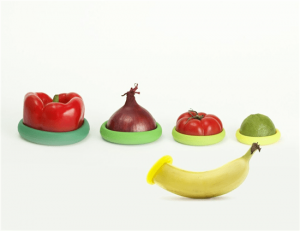 Foodhuggers.
Foodhuggers.
These funny silicone lids can be used in different ways. I use them as lids for the canned food of my cats or for a can of coconut cream that is not yet empty or to cover a glass. But they are primarily intended to preserve fruits and vegetables that have already been cut to prevent them from changing color or drying. You can buy them in different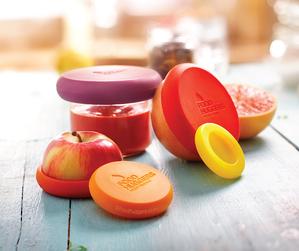 sizes and colors. You can even find special foodhuggers for avocados where there’s room for the kernel. Only the large pieces of fruit and vegetables, such as melon and pumpkin, I cover with a beeswax cloth. All the rest (banana, apple, pear, pepper, tomato, onion, cucumber, chicory, …) I cover with a foodhugger. Super easy solution!
sizes and colors. You can even find special foodhuggers for avocados where there’s room for the kernel. Only the large pieces of fruit and vegetables, such as melon and pumpkin, I cover with a beeswax cloth. All the rest (banana, apple, pear, pepper, tomato, onion, cucumber, chicory, …) I cover with a foodhugger. Super easy solution!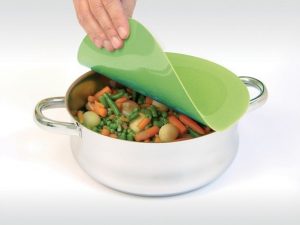 A silicone lid that fits all pots.
A silicone lid that fits all pots.
I bought one large silicone lid. Since it is completely flat, you can easily use it on smaller pots or pans. As soon as the lid is on the pot, it closes the pot (airtight). You can test it by carefully pulling the handle in the middle of the lid a little and you will see the pot will come with it! Ideal to cover a bowl with salad or a pot with some leftovers.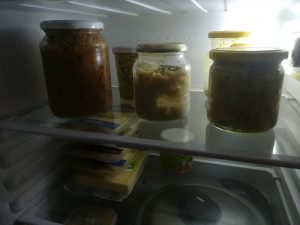 Glass jars with screw lid.
Glass jars with screw lid.
I use these to store leftovers. I like to cook sauces, stews or soups with lots of different vegetables. As a result I often have a large quantity of sauce/stew/soup. If you put these brews directly into the glass jars, screw the lid and turn them upside down, you get air-tight jars which enable you to keep the food longer. I also keep leftovers into a glass jar. No fridge full of colorful, neatly stacked plastic storage boxes (which often screte tiny plastic particles into the food that is inside, so you eat plastic!).- A reusable drinking bottle for drinking tap water.
In my tiny house you will never find disposable bottles! - A reusable shopping bag.
I have found a folding bag that I can easily carry in my handbag. Super convenient! - Choose oil in glass bottles.
Whether it is olive oil, sunflower oil, walnut oil … it doesn’t matter. You can find them almost all in 2 versions: in plastic bottles or in glass bottles. Easy choice! 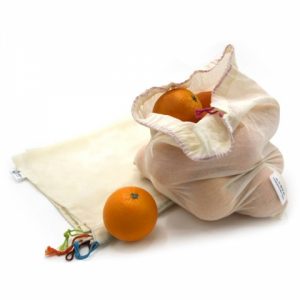 Cotton bags to buy vegetables, fruit and nuts.
Cotton bags to buy vegetables, fruit and nuts.
In most supermarket they no longer look at you with a frown when you arrive at the counter with your own bags in which you have loaded fruits, vegetables and nuts instead of using their own plastic bags. That saves a lot of plastic when unloading groceries at home!- You can take beeswax cloths and plastic storage boxes when you go to the store. Most butchers are used to the fact that more and more customers no longer want to buy the meat wrapped paper with plastic foil.
- Finally, you can choose to purchase as little processed food as possible. Almost everything that is not fresh, but processed in one way or another, is packaged; mostly in plastic. The more fresh, unprocessed food you buy, to process yourself, the less plastic packaging you take home …Do you have any tips yourself? Feel free to share them below!
